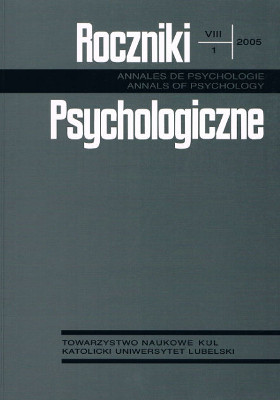Affect and cognition in consumer ethnocentrism
Abstract
This article examines purchase intention of products perceived as Polish or foreign among consumers with high and low levels of ethnocentrism. The author focuses on the affective and cognitive components of the attitude toward the products and their influence on purchase intentions. 100 people completed the study. The respondents ranged in age from 18 to 80, approximately half were men. Six different brands of packaged goods were used in the study. Three of them had names that were perceived as Polish; the other three products were perceived as foreign. The results of this study show a greater influence of the affective component on purchase intention. This was observed however only among consumers with high level of ethnocentrism and also when they perceived products to be Polish. A greater influence of cognition on purchase intention was observed among respondents with high level of consumer ethnocentrism and when they perceived products to be foreign. Also among consumers with low ethnocentrism regardless of the perceived origin of the products.
References
Bilkey, W. J., Nes, E. (1982). Country-of-origin effects on product evaluations. Journal of International Business Studies, 13, 89-99.
Breckler, S. J. (1984). Empirical validation of affect, behavior, and cognition as distinct components of attitude. Journal of Personality and Social Psychology. 47, 1191-1205.
Brewer, M. B., Campbell, D. T. (1976). Ethnocentrism and intergroup attitudes: East African evidence. New York: Wiley.
Buchanan, W., Cantril, H. (1953). How nations see each other. Urbana: University of Illinois Press.
Falkowski, A., Rożnowski, B., Witkowski, T. (1996). Etnocentryzm konsumencki – nowe wyzwanie dla marketingu. Marketing i rynek, 4, 6-11.
Forbes, H. D. (1985). Nationalism, ethnocentrism, and personality. Chicago: University of Chicago Press.
Johansson, J. K., Douglas, S. P., Nonaka, I. (1985). Assessing the impact of country of origin on product evaluations: A new methodological perspective. Journal of Marketing Research, 22, 388-396.
Katz, D., Stotland, E. (1959). A preliminary statement to a theory of attitude structure and change. W: S. Koch (red.), Psychology: A study of a science (t. 3). New York: McGraw-Hill.
Kaynak, E., Cavusgil, S. T. (1983). Consumer attitudes towards products of foreign origin: Do they vary across product classes? International Journal of Advertising, 2, 147-157.
Klineberg, O., Zavalloni, M. (1969). Nationalism and tribalism among African students. The Hague: Mouton.
Lambert, W. E., Klineberg, O. (1967). Children's views of foreign peoples. New York: Appleton-Century-Crofts.
Nagashima, A. (1970). A comparison of Japanese and U.S. attitudes toward foreign products. Journal of Marketing, 34, 68-77.
Nagashima, A. (1977). A comparative „Made-in” product image survey among Japanese businessmen. Journal of Marketing, 41, 95-100.
Netemeyer, R. G., Durvasula, S., Lichtenstein, D. R. (1991). A cross-national assessment of the reliability and validity of of the CETSCALE. Journal of Marketing Research, 28, 320-327.
Osgood, C. E., Suci, G. J., Tannenbaum, P. H. (1957). The measurement of meaning. Urbana: University of Illinois Press.
Park, C. W., Young, S. M. (1983). Types and levels of involvement and brand attitude formation. W: R. Bogozzi, A. Tybout (red.), Advances in consumer research (t. 10, s. 320-324). Ann Arbor, MI: Association for Consumer Research.
Reierson, C. (1966). Are foreign products seen as national stereotypes? Journal of Retailing, 42, 33-40.
Reynolds, V., Falger, V., Vine, I. (red.) (1987). The sociobiology of ethnocentrism: Evolutionary dimensions of xenophobia, discrimination, racism and nationalism. London: Croom Helm.
Rosenberg, M. J., Hovland, C. I. (1960). Cognitive, affective, and behavioral components of attitudes. W: C. I. Hovland, M. J. Rosenberg (red.), Attitude organization and change: An analysis of consistency among attitude components. New Haven: Yale University Press.
Shimp, T. A., Sharma, S. (1987). Consumer ethnocentrism: Construction and validation of the CETSCALE. Journal of Marketing Research, 24, 280-289.
Sumner, W. G. (1906). Folkways: A study of the sociological impotrance of usages, manners, customs, mores and morals. Boston: Ginn and Company.
Sumner, W. G. (1995). Naturalne sposoby postępowania w gromadzie. Studium socjologicznego znaczenia praktyk życia codziennego, manier, zwyczajów, obyczajów oraz kodeksów moralnych. Warszawa: PWN.
Triandis, H. C. (1971). Attitude and attitude change. New York: Wiley.
Copyright (c) 2005 Roczniki Psychologiczne

This work is licensed under a Creative Commons Attribution-NonCommercial-NoDerivatives 4.0 International License.


